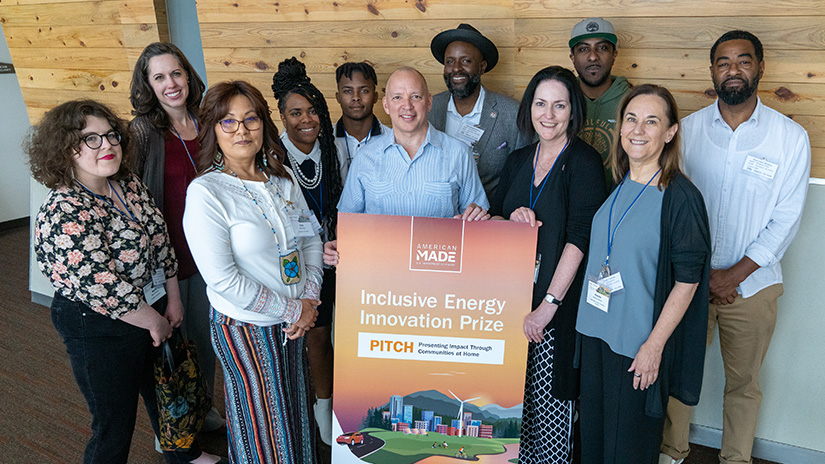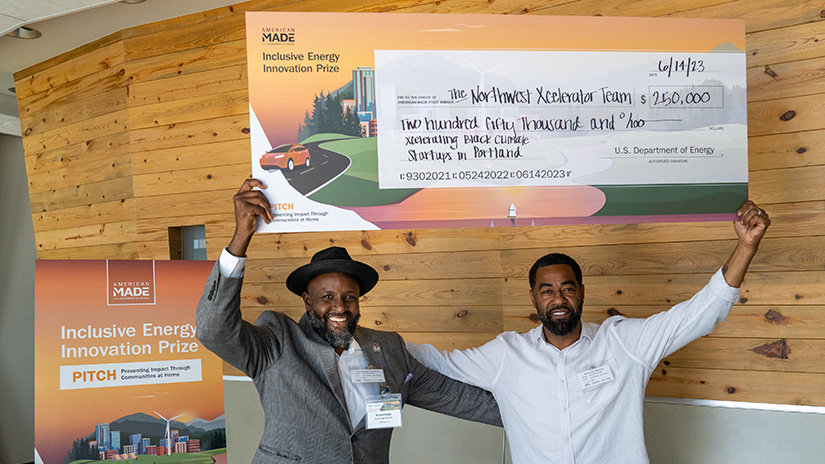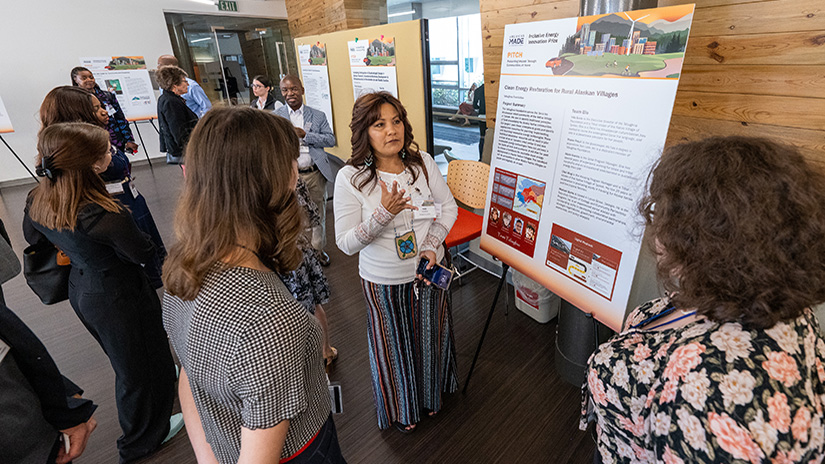Climate Justice Champions Celebrated at Finale of Inclusive Energy Innovation Prize
U.S. Department of Energy Named 6 Teams Grand Prize Winners at Finale Event
Over the last year, the teams competing in the second phase of the inaugural Inclusive Energy Innovation Prize have been hard at work engaging disadvantaged communities in the clean energy transition. They have been supporting solar startups in marginalized regions, balancing clean energy development with traditional principles of land stewardship in rural areas, and developing an acceleration support ecosystem for climate solution innovators from Black and underrepresented communities. Their strategies have been as diverse as the communities they are aiming to serve.
Those strategies took center stage during the prize’s finale event on June 13 and 14, where six Grand Prize winners were awarded $250,000 each. During the two-day Presenting Impact Through Communities at Home (PITCH) event, held at the U.S. Department of Energy's National Renewable Energy Laboratory (NREL) in Golden, Colorado, the finalist teams showcased their yearlong efforts to advance equitable and just clean energy ecosystems within their communities.

"It’s amazing to be in the room with all of these teams who are so passionate and dedicated to their causes," said Julie Baker, NREL’s deputy laboratory director and chief operating officer, who helped kick off the final winner announcement. "It’s wonderful for NREL to be able to support such important community-led initiatives."
At the end of the event, these six teams took home the Grand Prize:
Creative Collaborations Build Thriving Communities, New York, New York
The Clean Energy Academy team expanded its workforce training program for disadvantaged communities, which serves as an on-ramp for professionals looking to enter or transition into the clean energy workforce and provides an upskilling opportunity for existing workers.
Data Miners of the Mountain, Utuado, Puerto Rico
Under the leadership of the Cooperativa Hidroeléctrica de la Montaña, this team is working to accelerate microgrid deployment in rural and low-resourced communities. They are working to empower communities to take control of a clean energy future by installing rooftop solar and storage systems, starting with businesses and community service centers.
Empowering the Future Energy Workforce, Richland, Washington
Washington State University’s Tri-Cities team developed the Clean Energy Ambassadors Network, which aims to empower the future energy workforce by engaging and retaining students, particularly Hispanic/Latinx students. The team plans to continue this program and develop a clean energy certificate that will prepare students to join the next generation of clean energy leaders and thinkers.
Get Lit, Stay Lit, New Orleans, Louisiana
Feed the Second Line works with neighborhood restaurants to install solar panels and batteries and create a resilient citywide “Stay Lit” network. The team was inspired by Hurricane Ida, when New Orleans lost power for 10 days and restaurants were forced to throw away perishable food. This solution creates neighborhood food sites, cooling centers, and cell phone charging hubs for disaster scenarios, empowering local businesses to become first responders.
Tebughna Sunshine, Anchorage, Alaska
The Tebughna Foundation serves the Dena’ina Athabascan tribal community of the Native Village of Tyonek. This project uses traditional principles of land stewardship for Alaska Native communities to create and identify technical assistance resources for renewable energy technologies and pilot a solar array at Tyonek’s tribal center.
Xcelerating Black Climate Startups in Portland, Portland, Oregon
The Northwest Xcelerator team collaborated with VertueLab and the Port of Portland to develop and build a culturally specific, nonextractive acceleration support ecosystem for climate innovators from Black and underserved communities. The team has also been working on a program to accelerate startup development and incubation, facilities for hands-on workforce training, and incubator and maker spaces.

A Prize Designed for Inclusion
The Inclusive Energy Innovation Prize, which launched in September 2021 as part of the NREL-administered American-Made program, was designed to support the White House’s Justice40 Initiative. The prize is focused on climate and environmental justice as part of the transition to a net-zero-carbon economy by directly funding disadvantaged communities.
"I brag about the successes of these teams wherever I go," said Kerene Tayloe, management and program analyst for the U.S. Department of Energy’s Office of Economic Impact and Diversity, the office charged with implementing the Justice40 Initiative. "What we’ve learned through these prizes is that when we empower organizations with real dollars, we see the work that they’re capable of. They know what they need because they’re experiencing it firsthand. I’m excited to see where they go from here."
Phase One winners were announced in May 2022. As teams implemented their impact plans throughout Phase Two, they had access to support from the American-Made Network, made up of incubators, universities, think tanks, industry groups, and other U.S.-based organizations. These organizations helped teams with everything from their submission packages to raising nonfederal funds for their programs to collecting data to measure their programs’ impact. Case in point: A connector helped the Tebughna Sunshine team create a "playbook" that documented the steps they took to create their plan—one that can be distributed to all 228 Alaska Native villages to broaden their impact.

Making Change Beyond the PITCH Event
The connection between up-and-coming innovators and established organizations is vital to the teams’ ability to sustain their initiatives far beyond the competition. During the PITCH event, competing teams had the opportunity to interact with NREL staff, prize stakeholders, and other renewable energy and energy justice experts. Competitors shared more about the work they are doing to accelerate climate and clean energy technology within disadvantaged communities, with the goal of finding long-term support for their programs.
For Tinice Williams, executive director of Feed the Second Line, the prize helped get her team’s Get Lit, Stay Lit project off the ground—and now she has received even more support from the city of New Orleans. "We’re working in neighborhoods that are not the first priority during a hurricane," Williams said.
By equipping these restaurants to become first responders in disaster relief scenarios, they are helping these communities build self-resilience—and become their own first priority. Their project also helps nurture job creation by engaging local community members in solar installation on the 300 restaurants the team hopes to contract with. "Winning this prize means we’ll be able to add another person to the team who’s focused on workforce development," Williams said, making it a win in so many ways for their community.
Ten offices within the U.S. Department of Energy funded the inaugural Inclusive Energy Innovation Prize. To learn more about similar competitions and to stay up to date on future iterations of the Inclusive Energy Innovation Prize, visit the American-Made program and subscribe to the American-Made newsletter.

